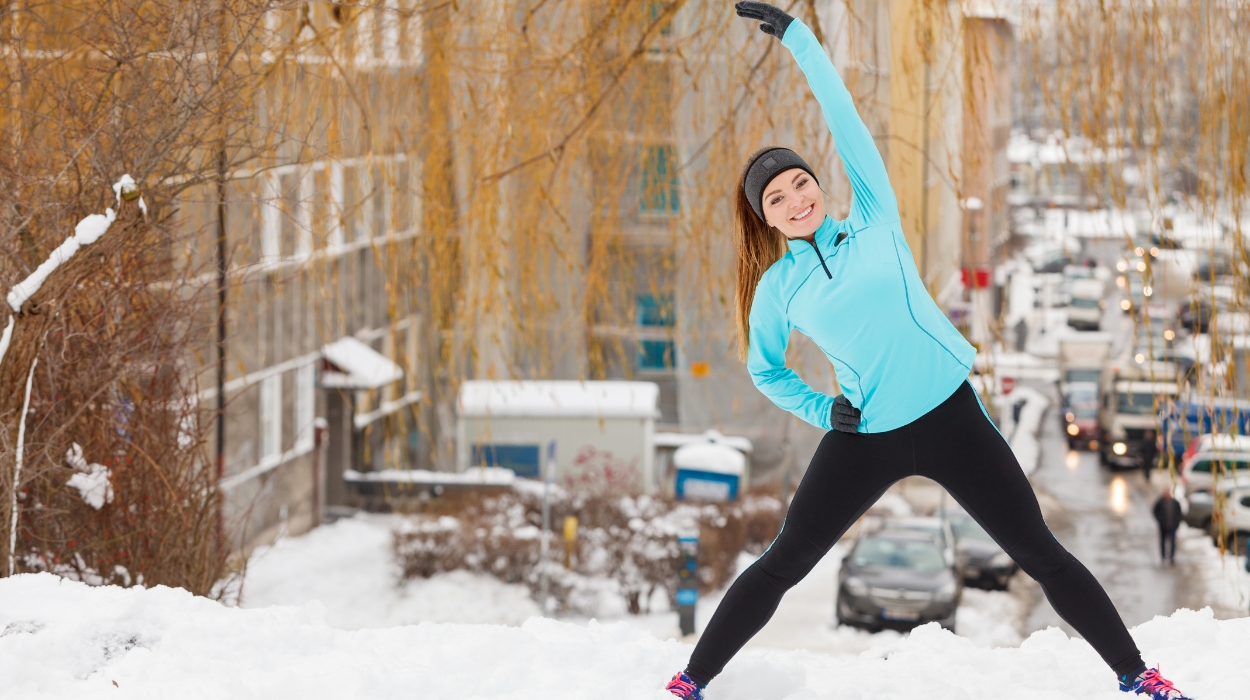 Expert's opinion
Expert's opinion
Expert's opinion
The article is a subjective view on this topic written by writers specializing in medical writing.
It may reflect on a personal journey surrounding struggles with an illness or medical condition, involve product comparisons, diet considerations, or other health-related opinions.
Although the view is entirely that of the writer, it is based on academic experiences and scientific research they have conducted; it is fact-checked by a team of degreed medical experts, and validated by sources attached to the article.
The numbers in parenthesis (1,2,3) will take you to clickable links to related scientific papers.
How To Lose Weight In The Winter: 3 Practical Tips

In cold weather, most people would rather be curled up under the covers than sweating on an elliptical. Cold weather chases people indoors, serving as a great excuse to skip a trip to the gym or even just a walk around the neighborhood. The winter weight that we pack as a result might stick with us for the rest of the year[1]. If you want to lose weight in winter, first be sure to keep holiday weight off. Then focus on healthy eating and exercise.
Losing weight isn’t easy at the best of times. It gets even harder when the weather is cold and unpleasant outside. Sometimes, it’s possible to use weight loss supplements to help. However, cold weather workouts can be a great way to burn some extra pounds.
Winter Weight Loss
Studies show that most people do a good job maintaining their weight throughout the year. It’s when we get to the holidays and winter that most of us pack on the pounds. Unfortunately, most people are unlikely to lose that weight during the year, so we all end up with weight gain. We can keep that weight gain off by building or maintaining healthy eating and exercise routines. Making those sorts of healthy choices will also lead to healthy weight loss.
3 Rules For Winter Weight Loss
Making healthy choices isn’t always so simple, however. Keeping winter weight off is a common goal, but it’s a tough one to achieve. In many ways, however, cold weather can be a great time for a workout. While it’s not always the most fun, there are a few advantages to exercising when it’s moderately cold out.
Just exercising isn’t enough to lose weight and be healthy, however. Good health requires healthy eating, and getting all the nutrients you need while limiting processed[2] and sweetened food. Avoiding junk may be tough, but it’s the only way to keep off the weight you lose.
Eat More Fruits and Veggies
Eating more fruits and veggies or having a diet is the simplest piece of weight loss and it may also be the most effective for metabolism[3] as well. The human body is tuned to run on a particular type of fuel, in the same way, that a car may need a higher grade of gas. That fuel[4] is made up mostly of fresh fruits and vegetables, with lesser amounts of protein and other stuff.
However, most Westerners’ diets are made up increasingly of highly processed food. A lot of food is processed in some way, for safety if nothing else. A lot of it will have sugar and salt added for flavor or additives to preserve the food or make it more colorful. It all ends up tasting great but is lacking in nutrition.
Sweets and processed foods don’t just cause weight gain. Eating too much sugar or carbohydrates can lead to elevated blood sugar, cardiovascular disease, and worse. It’s not just about eating fewer calories. Fruits and vegetables supply all the nutrients you need for a healthy lifestyle.
It can be tough to just suddenly swear off processed foods. Your body is still craving all of the fat and sugar in processed food, especially in the winter season when your energy needs may be higher. Instead of trying to cut junk food out, try to add more healthy food. With a more positive approach, the change might be easier.
At first, it may seem like you’re giving up all the tasty food you like, replacing it with salad or dietary meals. However, you don’t actually have to give up tasty food. Warmed-up fruit can be as delicious as ice cream while being way healthier. Have a nice cup of warming herbal tea or drink warm water instead of hot chocolate with marshmallows. Steaming soup, chock full of veggies, is a great way to warm up on a cold day.
An easy guideline is tracking the space on your plate. If fruits and veggies take up about half your plate, you’re in good shape. If they’re being crowded out by fat and carbs, you may need to rethink your eating habits.
Track Your Weight And Exercise
One reason winter weight loss can be tough is that we tend to let a lot of things slide during the holidays. We let ourselves indulge a little bit and end up with a few pounds it’s really hard to get rid of.
On the other hand, studies[5] have shown that when we know exactly how much weight we’re gaining, we’re less likely to splurge. Tracking your weight can be motivating, allowing you to see how much you gain and lose. It’s easier to refuse a slice of pie if you know how much it’s going to cost you on the scale.
Tracking your calorie intake can be helpful, though it can be difficult at times. Estimates of calories eaten and burned can help you meet your weight loss goals. It’s important to remember, however, that reaching a healthy weight isn’t just a matter of losing body fat.
Tracking your exercise is also important if you’re trying to meet winter weight loss goals. A nice day in winter is usually still pretty cold, so there’s always a reason to skip a workout. When you start tracking the workouts you skip, though, it gets harder to make excuses.
Make Exercise Part Of Your Routine
There are a lot of really fun things you can do in the winter season that will help burn calories. Cross-country skiing is a great exercise and also a nice way to get out into nature. Ice skating also is a great way to exercise. Even just sledding down a hill or building a snowman can get the blood pumping.
You don’t actually need to go out into the cold, however. Moderate physical activity of any kind can help lose weight and prevent a whole range of nasty health problems. The best part is, you don’t need to make a special time to go workout. Taking the stairs instead of the elevator, parking further away from the store, and tricks of that sort can be enough exercise to stay healthy.
Exercise of any sort is important to a healthy life. Keeping up those habits throughout the year is just as important, whatever the weather outside.
Why Exercise Outside In Cold Weather?
Even though you may not want to[6], exercising outside in moderately cold weather can actually make your time working out more effective. Your body has to use up energy just to keep you warm, so you actually will lose more calories standing outside in the cold than standing inside where it’s warm. That’s on top of the calories you burn in your workout.
There are a number of other health benefits to spending some time out in the cold. For example, it’s possible cold weather workouts can reduce the impact of allergies[7]. In terms of losing weight, one of the most important is the increased activity of brown fat cells[8].
When we think of fat, we’re thinking of white fat cells. We store excess energy in white fat for use later, but too much of it can cause all of the health problems associated with obesity.
Brown fat cells are a little different. They are packed with mitochondria, which are sort of like the engines of your body’s cells. Instead of just storing energy, brown fat cells burn it in a particularly effective way. They tend to be most active when it’s cold out, as burning energy produces more body temperature to reduce cold temperatures and keep you warm. As a result, your metabolism[9] kicks into a higher gear and you burn even more calories.
It’s also possible that cold weather actually causes your body to create more brown fat cells[10], which also then burns more calories. Brown fat cells may also have a range of other health benefits, though we don’t fully understand everything they do.
Conclusion
One important thing to remember is that, while cold-weather workouts can be great, cold weather can be dangerous. Dress appropriately, pay attention to your body’s warning signs, and have somewhere to go if there’s a problem.
While cold weather workouts might be more effective, to lose weight and keep it off you need to form or reinforce healthy habits. Eating healthy and finding ways to exercise, even when it’s freezing out, is always going to be the best way to lose weight.
+ 10 sources
Health Canal avoids using tertiary references. We have strict sourcing guidelines and rely on peer-reviewed studies, academic researches from medical associations and institutions. To ensure the accuracy of articles in Health Canal, you can read more about the editorial process here
- Yanovski, J.A., Yanovski, S.Z., Sovik, K.N., Nguyen, T.T., O’Neil, P.M. and Sebring, N.G. (2000). A Prospective Study of Holiday Weight Gain. [online] 342(12), pp.861–867. doi:https://doi.org/10.1056/nejm200003233421206.
- The Nutrition Source. (2019). Processed Foods and Health. [online] Available at: https://www.hsph.harvard.edu/nutritionsource/processed-foods/.
- Lampe, J.W. (1999). Health effects of vegetables and fruit: assessing mechanisms of action in human experimental studies. [online] 70(3), pp.475S490S. doi:https://doi.org/10.1093/ajcn/70.3.475s.
- Salwa Refat El-Zayat, Hiba Sibaii and El-Shamy, K.A. (2019). Physiological process of fat loss. [online] 43(1). doi:https://doi.org/10.1186/s42269-019-0238-z.
- Mason, F., Farley, A., Pallan, M., Sitch, A.J., Easter, C. and Daley, A. (2018). Effectiveness of a brief behavioural intervention to prevent weight gain over the Christmas holiday period: randomised controlled trial. [online] pp.k4867–k4867. doi:https://doi.org/10.1136/bmj.k4867.
- Wagner, A.L., Keusch, F., Yan, T. and Clarke, P. (2019). The impact of weather on summer and winter exercise behaviors. [online] 8(1), pp.39–45. doi:https://doi.org/10.1016/j.jshs.2016.07.007.
- Prossegger, J., Huber, D., Grafetstätter, C., Pichler, C., Braunschmid, H., Weisböck-Erdheim, R. and Hartl, A. (2019). Winter Exercise Reduces Allergic Airway Inflammation: A Randomized Controlled Study. [online] 16(11), pp.2040–2040. doi:https://doi.org/10.3390/ijerph16112040.
- Ellis, R. (2020). Brown Fat: What You Need to Know. [online] WebMD. Available at: https://www.webmd.com/diet/brown-fat-what-you-need-to-know#2.
- National Institutes of Health (NIH). (2019). How brown fat improves metabolism. [online] Available at: https://www.nih.gov/news-events/nih-research-matters/how-brown-fat-improves-metabolism.
- Nevena Jeremic, Chaturvedi, P. and Tyagi, S.C. (2016). Browning of White Fat: Novel Insight Into Factors, Mechanisms, and Therapeutics. [online] 232(1), pp.61–68. doi:https://doi.org/10.1002/jcp.25450.



